Queen-strawberry - Don't Mess With Me Cupcake




More Posts from Queen-strawberry and Others
Billie Lourd as Gigi in Booksmart (2019)
aka the crazy girl representation i´ve been waiting for








Ladies of the MCU + Misogyny
“Whatever women do, they must do twice as well as men to be thought half as good. Luckily, this is not difficult.” - Charlotte Whitton
What a kid is taught, is what a kid becomes
Mr. Turner (via girlmeetsworldfanblog)
“If there is any good in me, it’s from God.”


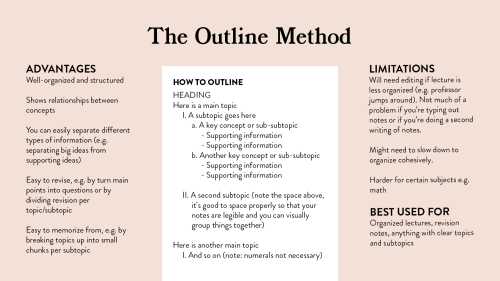
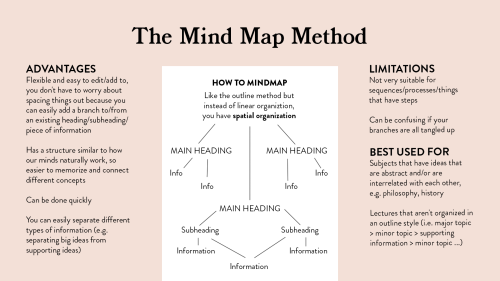

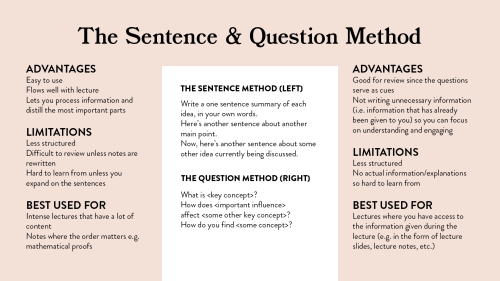


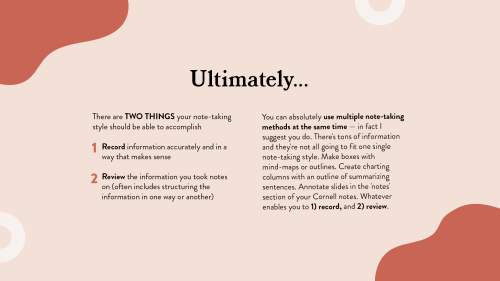
An Overview of Note-Taking Styles
Note-taking is one of the most essential skills a student should master. It allows you to record and review information to be used in the future. But what’s the best way to do so? Here’s an overview of note-taking styles that can help you maximize your learning!
Superheroes being 197% done with wii music playing
(source: harleyivy on Twitter)
difference between a report & a research paper
sources used: my history teacher & “Tips for Writing Analytic Research Papers.” (1998): n. pag. Harvard Kennedy School Shorenstein Center, 19 May 2009. Web. 29 May 2015.
• report
- organized regurgitation of facts gathered from research
- thesis statement is a general statement summarizing what your whole report is about
- thesis statement is NOT opinion or argument to be proven
- topic sentences of body paragraphs summarize what facts you’ll describe in that paragraph
- research + writing facts = report
• research paper
- organized analysis of facts gathered from research
- thesis statement identifies the overall argument or academic opinion that you will prove in your paper
- thesis statement must be (academic) opinion and argumentation
- research + writing facts + analysis = research paper
• so what is analysis? how do i do it?
analysis is basically breaking apart the facts you have found in your research and demonstrating critical thinking about those facts. make your analysis explicit - your reader should not have to infer or guess what your analysis is. it looks like:
• dissecting or breaking down larger events or concepts to explore the smaller parts [“dr. king’s plan comprised of three specific political and social actions” - then the author explains the parts]
• cause/effect [author describes situation that outrages dr. king - “this outrage motivated dr. king to deliver his speech”]
• identification or explanation of significance [“this speech is iconic in american history because…”]
• comparison of ideas from different sources, or differing opinions; examination of counterarguments [“critics of dr. king said…” “historians disagree…” “others have said…”]
• connection to broader ideas and themes in the relevant discipline [“king’s actions exemplify the overall trend in social activism towards nonviolent action to achieve change”]
• connection to experiences, examples in other geographic areas, time periods or disciplines [“this behavior is explained by psychologists as…” “the american civil rights movement was inspired by actions in…” “another leader who inspired people in similar ways was nelson mandela in south africa”]
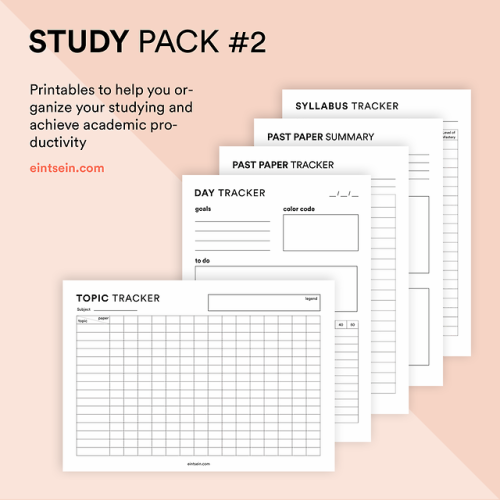
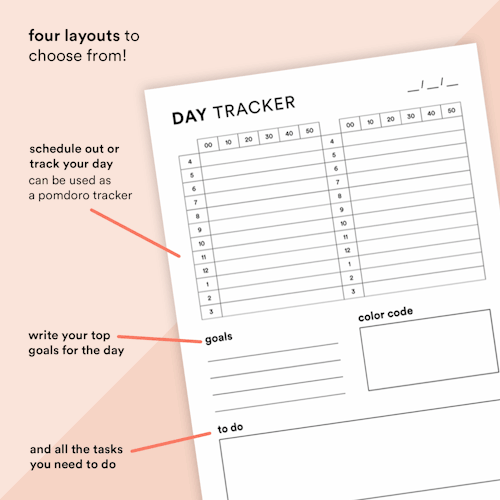
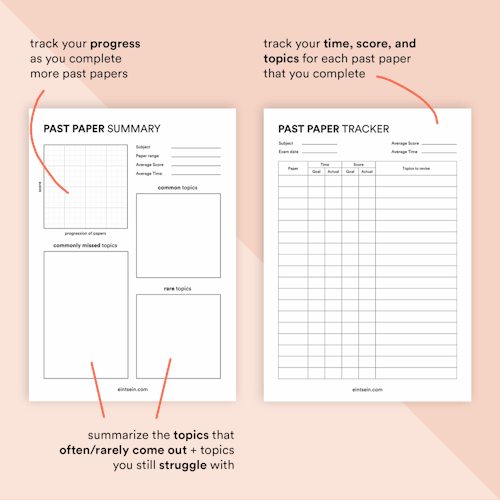
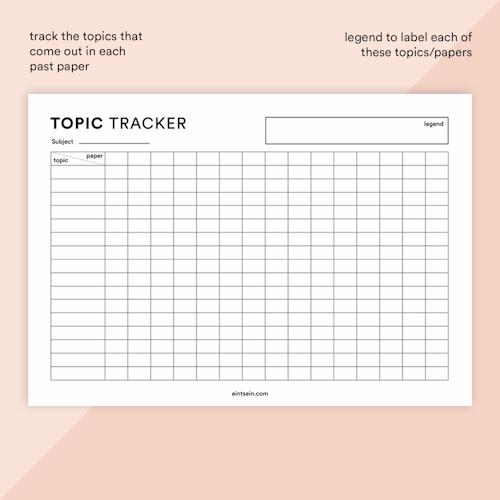
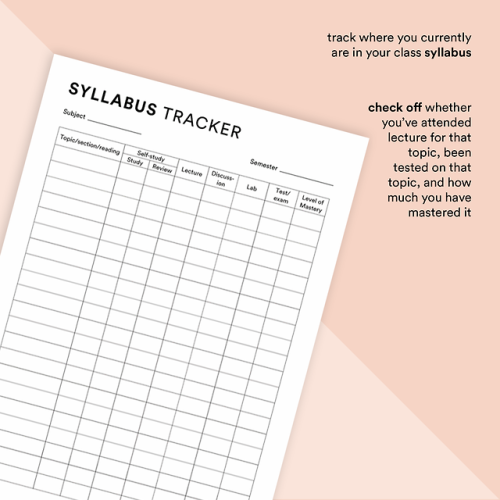
Study Pack #2
by Eintsein
It’s a new year, and whether you’re looking to organize your current study process, or try out something more productive, this study pack can help you out. These are some of the methods I use to help myself study more effectively, and I’ve decided to make some printables out of them so that you can use them too!
In this study pack:
Day Tracker: to schedule your day or keep track of how you use your time.
Past Paper Tracker: to track all the past papers you’re practicing.
Past Paper Summary: to summarize the trends in your past papers so you can plan your studying accordingly.
Topic Tracker: to track the topics that appear in the past papers.
Syllabus Tracker: to help you know where you currently are in your syllabus: what’s been done and what’s left to do, along with how well you know the material
Click here to download! (link to study drive)
Hope these help, and don’t forget to tag me with #eintsein when you use them - I’d love to see them in action! And if you have any questions, drop me an ask/message. Have an awesome day :)
P.S. Examples of how to use some of these printables are in the gifs above, but of course, you’re free to use them in whatever method works best for you. For example, for the topic tracker, instead of distinguishing between the number of marks for the question, you could keep track of how many marks you’ve received for that topic (i.e. 100% means you get full marks for every single question of that topic).
Reblog if you actually give a shit about anyone who's suicidal or depressed.
-
 simbilmyne liked this · 2 weeks ago
simbilmyne liked this · 2 weeks ago -
 mastabas-and-mushussu liked this · 2 weeks ago
mastabas-and-mushussu liked this · 2 weeks ago -
 mountvebuchius liked this · 2 weeks ago
mountvebuchius liked this · 2 weeks ago -
 krakenguard reblogged this · 2 weeks ago
krakenguard reblogged this · 2 weeks ago -
 lordofthegoldenflower reblogged this · 2 weeks ago
lordofthegoldenflower reblogged this · 2 weeks ago -
 domaldtrump liked this · 3 weeks ago
domaldtrump liked this · 3 weeks ago -
 simplesignifier reblogged this · 3 weeks ago
simplesignifier reblogged this · 3 weeks ago -
 toilet-paper-headbands reblogged this · 3 weeks ago
toilet-paper-headbands reblogged this · 3 weeks ago -
 prince-of-syne reblogged this · 3 weeks ago
prince-of-syne reblogged this · 3 weeks ago -
 prince-of-syne liked this · 3 weeks ago
prince-of-syne liked this · 3 weeks ago -
 imaliving-paroxysm liked this · 3 weeks ago
imaliving-paroxysm liked this · 3 weeks ago -
 sweetsimpleladybaker liked this · 3 weeks ago
sweetsimpleladybaker liked this · 3 weeks ago -
 jessiemwilhelm liked this · 3 weeks ago
jessiemwilhelm liked this · 3 weeks ago -
 swired reblogged this · 3 weeks ago
swired reblogged this · 3 weeks ago -
 swired liked this · 3 weeks ago
swired liked this · 3 weeks ago -
 g1ngan1nja liked this · 3 weeks ago
g1ngan1nja liked this · 3 weeks ago -
 thetrickster-blr-blog liked this · 3 weeks ago
thetrickster-blr-blog liked this · 3 weeks ago -
 blueintime liked this · 3 weeks ago
blueintime liked this · 3 weeks ago -
 charathemagician liked this · 3 weeks ago
charathemagician liked this · 3 weeks ago -
 zombiefishgirl reblogged this · 3 weeks ago
zombiefishgirl reblogged this · 3 weeks ago -
 raven-6-10 reblogged this · 3 weeks ago
raven-6-10 reblogged this · 3 weeks ago -
 raven-6-10 liked this · 3 weeks ago
raven-6-10 liked this · 3 weeks ago -
 bambugsinmymouth liked this · 3 weeks ago
bambugsinmymouth liked this · 3 weeks ago -
 robin-goodfellow reblogged this · 3 weeks ago
robin-goodfellow reblogged this · 3 weeks ago -
 listentothemad reblogged this · 3 weeks ago
listentothemad reblogged this · 3 weeks ago -
 depressiveoptimist liked this · 3 weeks ago
depressiveoptimist liked this · 3 weeks ago -
 kororopita reblogged this · 3 weeks ago
kororopita reblogged this · 3 weeks ago -
 doodlelover reblogged this · 3 weeks ago
doodlelover reblogged this · 3 weeks ago -
 knicks-knacks reblogged this · 3 weeks ago
knicks-knacks reblogged this · 3 weeks ago -
 shores-of-esgalduin liked this · 3 weeks ago
shores-of-esgalduin liked this · 3 weeks ago -
 s-leary liked this · 3 weeks ago
s-leary liked this · 3 weeks ago -
 theyforcedmetogetablog reblogged this · 3 weeks ago
theyforcedmetogetablog reblogged this · 3 weeks ago -
 theyforcedmetogetablog liked this · 3 weeks ago
theyforcedmetogetablog liked this · 3 weeks ago -
 starry-eyed-oaks liked this · 3 weeks ago
starry-eyed-oaks liked this · 3 weeks ago -
 imjustheretoreads-blog liked this · 3 weeks ago
imjustheretoreads-blog liked this · 3 weeks ago -
 king-carnivore reblogged this · 3 weeks ago
king-carnivore reblogged this · 3 weeks ago -
 ruledbyproblematique liked this · 3 weeks ago
ruledbyproblematique liked this · 3 weeks ago -
 sketma reblogged this · 3 weeks ago
sketma reblogged this · 3 weeks ago -
 aevenesence liked this · 3 weeks ago
aevenesence liked this · 3 weeks ago -
 knicks-knacks liked this · 3 weeks ago
knicks-knacks liked this · 3 weeks ago -
 justliketetris reblogged this · 3 weeks ago
justliketetris reblogged this · 3 weeks ago -
 firelxdykatara liked this · 3 weeks ago
firelxdykatara liked this · 3 weeks ago -
 penguiegg liked this · 3 weeks ago
penguiegg liked this · 3 weeks ago -
 itsachristastrophe liked this · 3 weeks ago
itsachristastrophe liked this · 3 weeks ago -
 airandangels reblogged this · 3 weeks ago
airandangels reblogged this · 3 weeks ago -
 captaincoffeegirl515 reblogged this · 4 weeks ago
captaincoffeegirl515 reblogged this · 4 weeks ago -
 danse-de-macabre liked this · 4 weeks ago
danse-de-macabre liked this · 4 weeks ago -
 beboots reblogged this · 4 weeks ago
beboots reblogged this · 4 weeks ago -
 affectionatepro liked this · 1 month ago
affectionatepro liked this · 1 month ago -
 fallen-angel-lucifer liked this · 1 month ago
fallen-angel-lucifer liked this · 1 month ago





